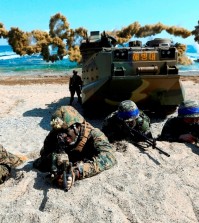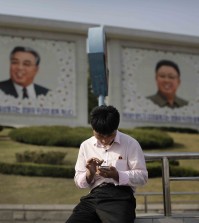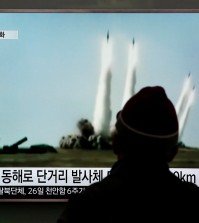- California Assembly OKs highest minimum wage in nation
- S. Korea unveils first graphic cigarette warnings
- US joins with South Korea, Japan in bid to deter North Korea
- LPGA golfer Chun In-gee finally back in action
- S. Korea won’t be top seed in final World Cup qualification round
- US men’s soccer misses 2nd straight Olympics
- US back on track in qualifying with 4-0 win over Guatemala
- High-intensity workout injuries spawn cottage industry
- CDC expands range of Zika mosquitoes into parts of Northeast
- Who knew? ‘The Walking Dead’ is helping families connect
North Korea fires two more missiles
By Kim Eun-jung
(Yonhap) — North Korea fired two short-range missiles into the sea off its east coast Monday, Seoul’s defense ministry said, in its latest provocation seen as a reaction to the ongoing joint military drills between South Korea and the United States.
One missile was fired from the Gitdaeryeong area and the other from Wonsan, both on the North’s southeastern coast, in the northeast direction beginning at 6:19 a.m. KST. “The missiles are evaluated to have flown over 500 kilometers,” ministry spokesman Kim Min-seok said in a briefing, adding they were believed to be of the Scud-C type.
It is the second such launch of the short-range missiles in a week. Last Thursday, Pyongyang fired four Scud missiles from the same area, which flew about 220 km in a northeast direction.
The latest unprovoked firings came as South Korea and the U.S. have been conducting annual joint military exercises that Pyongyang has condemned as a rehearsal for an invasion of the communist nation. On the first day of the Key Resolve drills last week, the North briefly violated the tense western sea border three times.
“North Korea is taking a two-faced approach, showing the reconciliatory peace gesture on the surface, while launching provocations on the other hand,” the spokesman said in a briefing. Kim said Pyongyang’s missile launches are a violation of U.N. Security Council resolutions that ban use of the ballistic missile technology, though the missiles were fired into its territorial waters.
“In light of the border trespassing and short-range missile launches, South Korean and U.S. forces have stepped up their surveillance status to closely watch the North Korean military’s latest moves,” Kim said. “We are ready to strike back if provoked.”
Another government official echoed Kim’s stance, saying that Seoul will consult with related countries about how they will proceed after the North’s U.N. resolution violation. “North Korea’s latest short-range missile launch constitutes a violation of the U.N. Security Council’s resolutions against the North,” the government official said on the condition of anonymity.
According to an analysis of the missiles’ trajectory, both of them fell within Japan’s air defense identification zone. One fell in a region 400 km northwest of Wajima, Ishikawa Prefecture, while the other landed in a region 456 km northwest of the same area.
“North Korea fired the missiles into an area where civilian airlines and ships pass by. Not proclaiming a no-sail, no-fly zone (before the missile launch) is a violation of international regulation,” a senior government source said, asking for anonymity due to the sensitivity of the issue.
Military officials say there are chances of additional missile launches considering that the North has been controlling fishing boasts in both East and Yellow Sea border regions.
Experts estimate that the North has over 700 Scud-B and Scud-C missiles, recently deploying Scud-ER, with a range of more than 700 km and improved accuracy. The communist regime has also pursued the development of long-range missiles that can reach as far as the continental U.S.
Seoul officials have raised concerns that the missile launches could hamper the reconciliatory mood between the two Koreas following the reunions of families separated by the 1950-53 Korean War at the North’s Mount Kumgang resort in late February. “Considering that the North fired the missiles into the sea, it is deemed a low-level provocation,” a senior military official said, asking for anonymity. “But it is worrisome that (the missile launch) could negatively affect inter-Korean relations when hopes are high for better ties in light of the family reunions.”
The two-week Key Resolve is a computer-based command post exercise, which ends Thursday, while combined field training Foal Eagle, involving 7,500 American troops, runs through April 18.
Amid the warming inter-Korean ties, Seoul and Washington have been staging relatively low-profile exercises this year so as not to provoke the North, but their drills have nevertheless drawn fierce criticism from the communist state.
Pyongyang had issued near-daily threats during last year’s joint drills that were held following its third nuclear test, prompting the U.S. to send high-profile nuclear bombers and stealth jets to the Korean Peninsula in a show of force.
On Monday, the North’s state-run Rodong Sinmun denounced Washington for raising tensions on the peninsula by holding the Key Resolve and sending the B-52 bombers last year.
“The United States is stepping up military provocations, going against the tide of peace and eased tension on the Korean Peninsula,” said an editorial carried by the paper. “The U.S. does not welcome improved inter-Korean ties and is conducting all forms of maneuvers to intensify confrontations between the two Koreas.”
Amid rising tensions, U.S. nuclear-powered submarine USS Columbus (SSN-762) and the 7th Fleet flagship USS Blue Ridge arrived at the southeastern port city of Busan earlier in the day to participate in the joint exercises with South Korea.
About 28,500 U.S. troops are stationed in South Korea to help deter North Korean aggression. South and North Korea remain technically in a state of war as the Korean War ended in a ceasefire, not a peace treaty.















